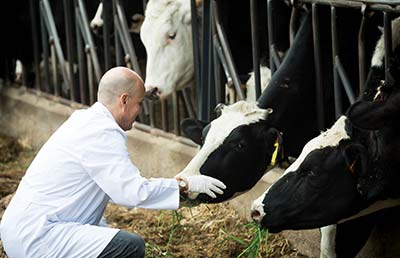Large cattle ranchers/dairies may qualify for immediate expensing of cost to raise calves.

When I talk to large ranchers/dairies who are on accrual basis of accounting and do not qualify as a small business, they assume that they are subjected to the UNICAP rules under 263A and needs to capitalize cattle/cows and depreciate cattle/cows instead of expensing or treating as inventory. This presumption is partially correct, if the cows/bulls were purchased for dairy production and/or breeding, they will need to be capitalized and if they were purchased for resale, they are treated as inventory. However, cost incurred to raise calves born on the farm (not purchased) may be expensed as incurred, even if taxpayers are using accrual method of accounting for income tax purposes.
UNICAP rules under IRC Sec 263A don’t apply to the costs of producing animals in a farming business if the taxpayer is not required to use an accrual method of accounting and is not deemed a tax shelter. Accordingly, large passthrough operations (partnerships/S-Corporations) using accrual method of accounting may not be required to capitalize the cost incurred to raise the calves born on the ranch. Please note partnerships owned by private equity funds with C-corporations blockers in the ownership chain don’t meet this exception.
So you ask what about tax shelter? This limitation may not be as bad as it appears. Most of the time people refer to IRC section 461 rules and say the company is in a loss this year and is allocating 35% (or more) of the loss to limited partners/entrepreneur, thus, deemed a tax shelter. To conclude if this treatment is true or not, further analysis is needed on the ownership.
IRC 461(k)(2) provides exceptions to who is deemed limited partner/entrepreneur including active farmer exception and family member of a grandparent of an active farmer if the interest in the partnership or the enterprise is attributable to the active participation of such farmer. So, if the limited partner is an active farmer or the interest was passed down in a multi-generational family business, such interest may not be deemed “limited” for tax shelter rules.
There are other requirements that can cause business to qualify as tax shelter; thus, those requirements needs to be looked at as well.
Also, emphasis needs to be made that this exception only applies to animals produced in ‘faming business’. In general, a farming business means a trade or business involving the cultivation of land or the raising or harvesting of any agricultural or horticultural commodity. If taxpayers have multiple trades or businesses (though a single legal entity is used for all businesses), an analysis needs to be done to identify if one of the businesses qualifies as farming. As an example, for diaries where a significant portion of the income is from processing/packing milk products, the question arises if the business is a ‘farming business’. In these instances, analysis needs to be done to determine if the dairy has one or two trades or businesses – 1st as packing/processing and 2nd as farming. A few of the factors in this analysis will include:
- How are operations managed, is there separate team running farming operations?
- Are there separate books/records?
- How does management evaluate performance – combined/separate?
- Are there separate targets for farming operations?
Most of the time, for non C-corporations, the reason for using accrual method of accounting for farming businesses generally have to do with non-tax business reasons and not because they are required IRC sections 446 to 448, method of accounting. If that’s the case, change in method of accounting should be considered to start expensing costs incurred to raise the calves.
Mohit is a certified public accountant with over 13 years of experience specializing in food and beverage, agricultural, and cooperative space. His experience includes serving a broad variety of private and public companies including C and S corporations, multi member/partner partnerships, multigenerational family-owned businesses, multi-state manufacturing/distribution entities, and private equity agriculture ventures.

Mohit:
We expense purchased cattle because the “unit” cost is <$2,500 and the dairies have elected to expense items less than $2,500.